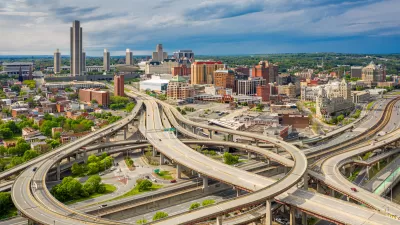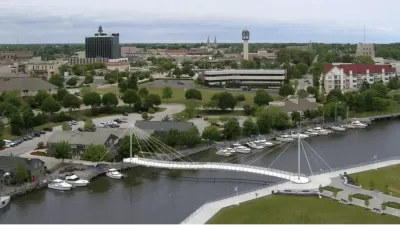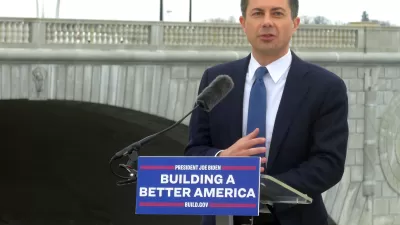The Biden administration must combine increased funding with policies that mandate and encourage transit-oriented planning.

The public transit funding included in the Biden administration's American Jobs Plan "would almost double the annual federal contribution to public transportation, which currently accounts for 17% of total transit spending," writes Simon Berrebi for Bloomberg CityLab, but increased oversight and guidance are required to maximize the effects of the spending, increase access and equity, and fight climate change. The plan, which proposes an $85 billion investment in public transit, recognizes that "to expand access to jobs, health care, schools and other destinations that keep the economy running, the key is public transportation, which provides mobility for all while minimizing congestion, pollution and energy consumption."
The new administration's infrastructure package, writes Berrebi, provides "a momentous opportunity to fully integrate transit in a new paradigm of infrastructure planning" and shift emphasis to public transit by prioritizing bus lanes, signal priority, and bike and pedestrian infrastructure as integral parts of transportation projects. "Planning for a transit-oriented future would multiply the social, environmental, and economic benefits of this historic investment."
According to Berrebi, "successful transportation and land-use policies must be planned together," and "the American Jobs Plan is an opportunity to do just that on a national scale." In addition to channeling funding to local transit systems, the administration should also ensure that housing funding is used to "build and preserve units near transit" and that new projects and initiatives "integrate public transportation deeper into the fabric of society."
FULL STORY: The Case For a Transit-First Infrastructure Plan

Alabama: Trump Terminates Settlements for Black Communities Harmed By Raw Sewage
Trump deemed the landmark civil rights agreement “illegal DEI and environmental justice policy.”

Planetizen Federal Action Tracker
A weekly monitor of how Trump’s orders and actions are impacting planners and planning in America.

Why Should We Subsidize Public Transportation?
Many public transit agencies face financial stress due to rising costs, declining fare revenue, and declining subsidies. Transit advocates must provide a strong business case for increasing public transit funding.

Understanding Road Diets
An explainer from Momentum highlights the advantages of reducing vehicle lanes in favor of more bike, transit, and pedestrian infrastructure.

New California Law Regulates Warehouse Pollution
A new law tightens building and emissions regulations for large distribution warehouses to mitigate air pollution and traffic in surrounding communities.

Phoenix Announces Opening Date for Light Rail Extension
The South Central extension will connect South Phoenix to downtown and other major hubs starting on June 7.
Urban Design for Planners 1: Software Tools
This six-course series explores essential urban design concepts using open source software and equips planners with the tools they need to participate fully in the urban design process.
Planning for Universal Design
Learn the tools for implementing Universal Design in planning regulations.
Caltrans
Smith Gee Studio
Institute for Housing and Urban Development Studies (IHS)
City of Grandview
Harvard GSD Executive Education
Toledo-Lucas County Plan Commissions
Salt Lake City
NYU Wagner Graduate School of Public Service





























